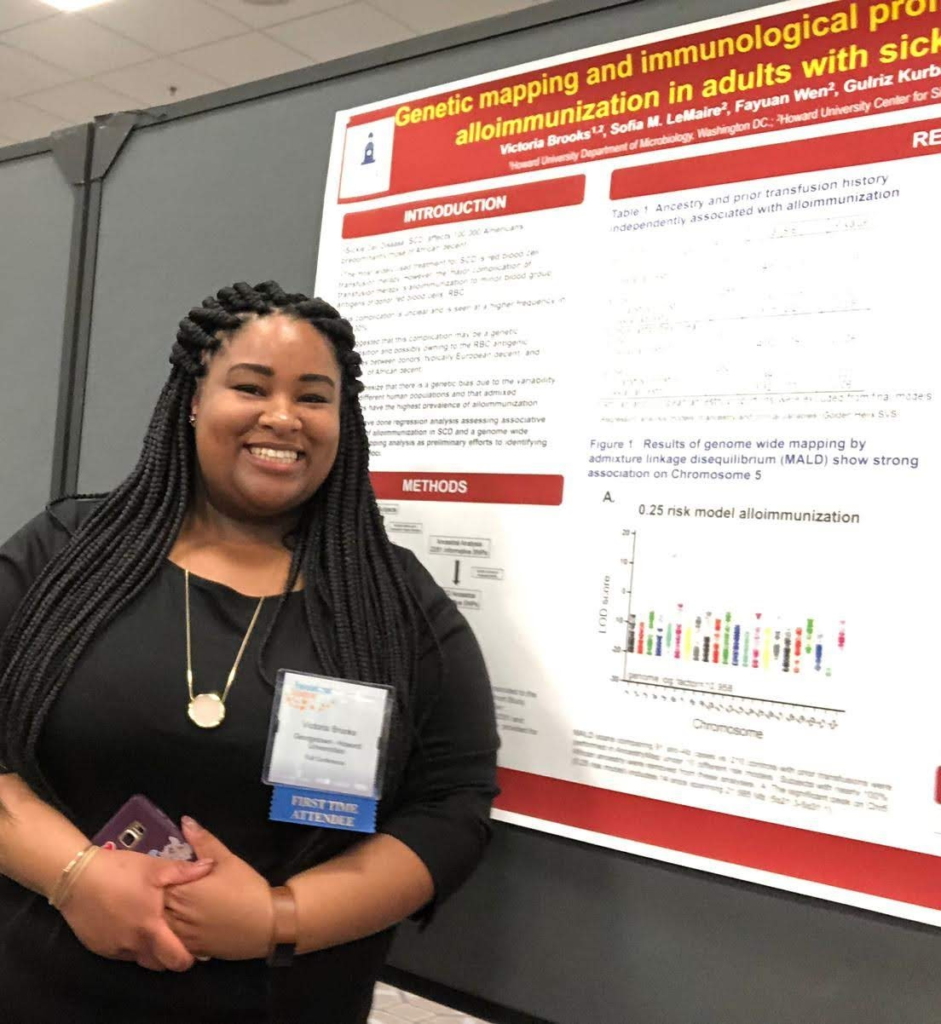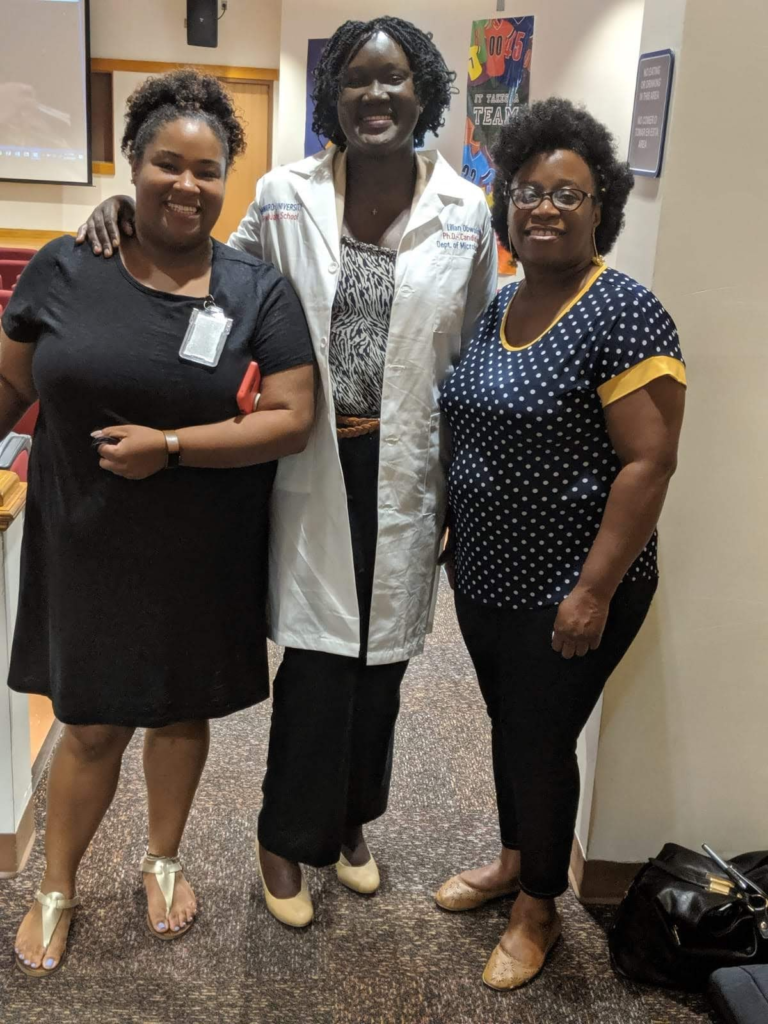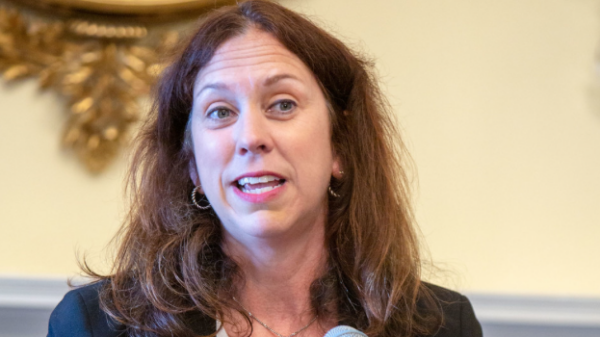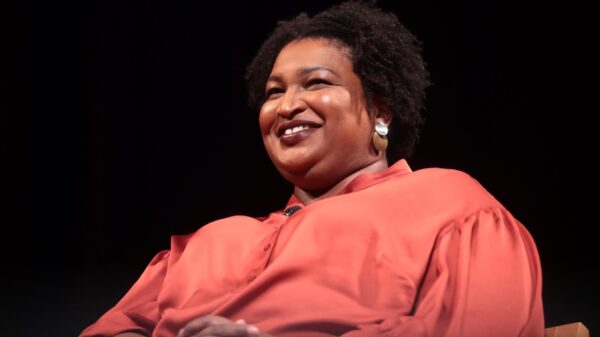
In 2014, when doctoral candidate Victoria Brooks began her journey in the Department of Microbiology, she planned to earn her Ph.D. in about five years. That was until the pandemic hit, and the possibility of Brooks finishing her Howard education was under threat.
The pandemic halted Brooks’ research and progress to a standstill. She felt defeated.
“It was like this mental weight that kind of felt like ‘Ugh, I’m capping. I’m capping out on my potential,’” she said. “Because I’m not able to grow in the ways that I wanted to or in the rate that I wanted to.”
Dr. James Taylor, Brooks’ Thesis Advisor, said that the pandemic “absolutely suspended everything,” and stressed how detrimental the pandemic was to the 32-year-old’s research.
“And so everything that she had proposed was going to be in the lab and everything shut down for nearly two years in the medical school – nothing in person,” he said. “And you can’t do that when you’re a Ph.D. student who’s dependent on doing lab experiments to generate data for a thesis.”

During this time, Brooks said she was almost to the point of giving up and close to reaching the limit of years she could study at the university.
According to Howard University’s general requirements for a Ph.D. degree, students are to have completed their Ph.D. degree within a maximum of seven years from the initial date they registered in the program. “Any student who exceeds this period may be dismissed,” it says.
In 2021, with her deadline fast approaching, Brooks had no choice but to plead her case to the graduate school and request more time.
Brooks explained that this process involved submitting several forms to petition an extension of time at the graduate school. In these forms, she had to explain her reasoning for needing more time and her plans for the additional requested time. This is submitted to the graduate school and reviewed by the board.
She expressed that the process was stressful for her and even embarrassing considering how hard she had worked leading up to the event.
“But it was one of those things where you had to plead your case and that was frustrating because I felt like the reason I was sitting before them was because of reasons that were out of my hands a lot of the time,” she said.
Brooks expressed that her mentors and colleagues at Howard ultimately were her saving grace during this time of stress and uncertainty.
“And so I think that for me, my greatest benefit is having them and us having each other,” Brooks said. “Because you know the road gets rough.”
Taylor was one of many who pushed for Brooks to stay in the Ph.D. program, stressing the importance of having minority representation in the sciences.
“And I told her it was too important for her to quit without getting her degree. We had to do this. We had no option,” he said. “If nothing else, even if she decides to leave science completely, getting her degree was absolutely very important.”
Prior to attending Howard University Graduate School, Brooks received her bachelor’s degree in Microbiology and Biotechnology at Missouri State University. She described feeling like she was missing that “diversifying aspect” at her schools, especially in the sciences, and that it was one of her motivating factors when picking Howard for graduate school.
“It’s different when you work alongside people that look like you. It is more fulfilling sometimes, especially when in the workplace you may not have that luxury,” she said. “I think that was one of the greater experiences about being at Howard.”

Brooks continued to stress the importance of finding community while describing her time at Howard and said it was critical to surviving her Ph.D. program. She said as time went on, her friends began to feel more like family and Howard began to feel like her home away from home.
“And to have that sense of family, to find it and have it was something that was pivotal for me,” Brooks said. “I think a lot of the times those people who don’t get to establish that in their first few years or you know they don’t cultivate it in any aspect I think they struggle a bit more.”
Jerome Oliver, who was a Ph.D. student alongside Brooks, spoke to her perseverance. He commended her on her own problem solving skills and her ability to work through concepts.
“I was able to see Victoria as she worked through these problems. I saw her as she tried to identify literature to help her understand concepts that she never encountered before,” Oliver said. “In her dissertation defense, I was able to see her prove through all this hard work that she truly is an expert in her field of study and all those times made it worth it.”
After her eight-year-long journey, Brooks will graduate in May.
She successfully defended her dissertation titled “A Clinical and Genetic Analysis of Alloimmunization in Chronically Transfused Sickle Cell Disease Patients,” a research project that examines alloimmunization in sickle cell disease patients and the genetic factors potentially causing it, according to Brooks.
Alloimmunization in sickle cell disease patients is when there is an immune response which is the body’s defense against foreign substances. The immune response is triggered by exposure to foreign antigens, oftentimes occurring after blood transfusions, according to Osmosis.org.
Taylor shared his admiration for Brooks’ dissertation and its impact, which he indicated is still in its manuscript stage as if two weeks ago.
“Her thesis dissertation – she hit it out of the ballpark,” he said. “She identified things that I just was completely surprised by, and she has moved the field forward.”
Brooks has been involved in various things throughout her time at Howard. This includes being a TL1 grant recipient, a NIH funded training grant that supports Doctoral and Pre-Doctoral scholars and a teaching assistant (TA) for courses like Microbiology Lab, SEA-PHAGES and Microbiology for the medical, nursing and dental schools. She was also a mentor in the Graduate School’s Graduate peer mentorship program, run by Dr. Kamla Deonauth, where she mentored incoming Ph.D. students.
Currently, Brooks works at the United States Patent and Trademark Office where she reviews patents for accuracy and assesses inventions, however, she revealed still feels a strong passion for research and laboratory work. She hopes to get back into the lab soon and continue the work that she has been doing.
Brooks expresses that she is relieved about graduating, but that she’s appreciative of all that she’s learned while in graduate school.
“But like I said, being on the other side now I’m glad it’s over, but I learned a lot you know. I learned a lot personally too,” she said. “You know the strengths and the ways that you can push through to your victories so yeah.”
Brooks also expresses gratitude towards Howard for providing her a community and numerous professional development opportunities.
“…the way we were able to have that community at Howard and going through a lot of things that we went through. It’s just the things that Howard offered as well,” She said. “Cause there are a lot of programs and partnerships to which are made available to HBCU students and specifically speaking Howard students.”
She maintains that graduating feels surreal, but that she’s ultimately glad her “long nights and tears of frustration” are a thing of the past.
Taylor expressed his pride for Brooks and all that she has accomplished despite the obstacles faced.
“I can’t emphasize this enough, I am so proud of her. We had everything stacked against us, especially the pandemic and her clock ticking,” Taylor said. “…She persevered and I am so proud of her for doing this.”
Copy edited by Jadyn Barnett









